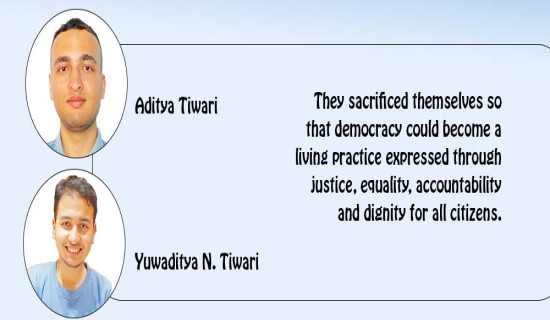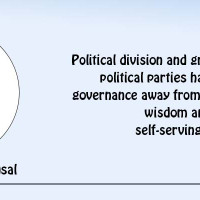- Friday, 30 January 2026
Ensuring Universal Health Coverage
Jhabindra Bhandari
Universal health coverage aims to ensure that all populations are able to access health services without any financial hardships. Largely, it incorporates a range of essential health services, including from health promotion to prevention, treatment, rehabilitation, and palliative care. However, the progress towards achieving universal health coverage has been slow.
Historically, health for all has been an ambitious social goal since the 1978 Alma-Ata Declaration. After this important declaration, there is a growing consensus that health is a fundamental human right. And it is broadly based on the principles of equity and community participation.
Access to health care
Access to essential health care services for majority of people, who are poor and socially disadvantaged, has been a major policy debate in developing countries. Therefore, political leaders, policy makers and external development partners have been raising the unfinished agenda of achieving universal health coverage for years. To this end, more emphasis is needed to enhance meaningful engagement of communities and ensure equitable access to health care services for all.
In this context, WHO estimates that by 2030, up to 61 per cent of population will not have access to essential health services. More importantly, poor and socially disadvantaged communities are most likely to be excluded from those health services. Every year, a vast majority of the populations are pushed into extreme poverty because of out-of-pocket spending on health. Political context greatly matters in terms of prioritising public policies and strategies to ensure equitable distributions of resources in the health sector. And the changing context of globalisation, politics, migration, trade and international funding environment largely influences the landscape of achieving the universal health coverage in the developing countries.
For example, the new policy provisions such as free health care policy, health insurance and health care to senior citizens at the health facilities are considered as important initiatives of the governments to advance pro-poor health policies so that poor and socially disadvantaged populations can benefit the most in the communities. In the federal context, the policy making processes are institutionally decentralised and political power is more dispersed at the province and local level. This offers ample opportunities for local governments to appropriately prioritise adequate resources in order to strengthen the resilient health systems for effective delivery of quality health services.
However, the various interests of political leaders and senior government officials may diverge due to differences in political, ideological, technical and socio-cultural beliefs. Therefore, we need to carefully explore how political interests, ideas, and institutions shape the universal health coverage at large and systematically review the ways in which politics can facilitate evidence-informed health care reform.
Political power and commitments across the governments are still in transition in terms of effective implementation of new health policies, strategies and guidelines at all levels. To a large extent, provincial and local governments lack capacity for an effective implementation of those policies and strategies. Therefore, there are significant political challenges of the local governments to implement universal health coverage policies, strategies and plans. Despite varied socio-political interests, federal government needs to invest more in capacity development of provincial and local governments in strengthening resilient health systems for better health outcomes. During local elections, there are often new and promising political commitments for ensuring social safety nets and health care reform at all levels.
With these political commitments, hard-to-reach populations are hopefully able to access health services without any socio-political, economic, cultural and geographical barriers. Unfortunately, many of these commitments are not effectively translated in to actions. Therefore, there are often growing criticisms of the political parties’ popular agenda in their manifesto during the elections. Unfortunately, the broader issues of health inequities and social injustice are not adequately addressed yet.
On the other side, the persistent unequal political and economic systems that contribute to poor health need to be critically reviewed for evidence-informed public policy making. The dynamic relationship between political leaders, policy makers and non-state actors is critical to harness the political interests, trust and priorities in achieving universal health coverage.
Interestingly, the global health policies have underscored the emerging needs of multi-sector and multi-stakeholder engagement to ensure healthy lives and overall well-being for all. At the local level, the existing efforts of awareness-raising, political lobbying and advocacy for universal health coverage are still limited. In this scenario, the political mobilisation greatly enhances equitable distribution of political powers and interests in health policy making processes.
Health financing
To make health for all a reality, political leaders and policy makers need to invest more in strengthening health systems governance at local level. In this context, Ministry of Health and Population (MoHP) has recently developed a national health financing strategy in order to address the investment needs and priorities for the universal health coverage. Similarly, the MoHP is presently drafting a new forward looking national health strategy (2022-2030) in a participatory approach.
Like many other countries, Nepal aims to achieve the universal health coverage and health related targets of Sustainable Development Goals (SDGs) by 2030. Considering the federal context, new socio-political insights are needed to address the broader issues of political economy of inequality, socio-cultural diversity, and adaptations in health care settings. The high priority agenda of the universal health coverage is crucial to ensure access to health care services for poor and disadvantaged communities who are left behind for years.
(PhD in global health, Bhandari writes on health and development issues.)

















